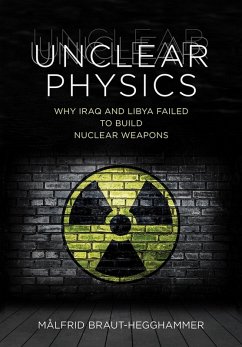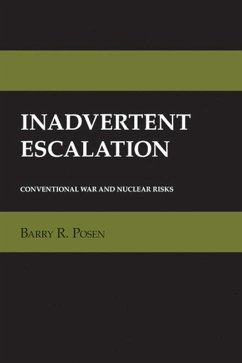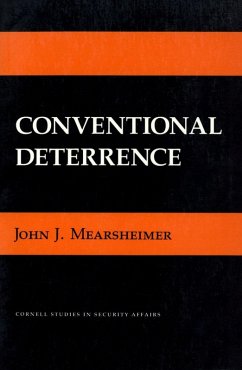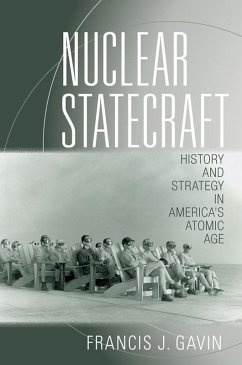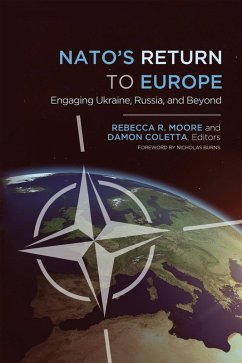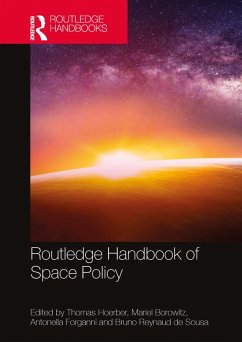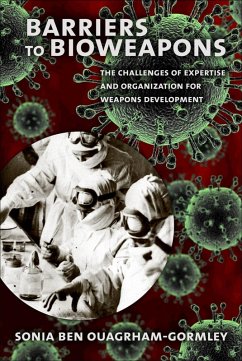
Barriers to Bioweapons (eBook, ePUB)
The Challenges of Expertise and Organization for Weapons Development

PAYBACK Punkte
13 °P sammeln!
[Barriers to Bioweapons] is a must-read for nonproliferation experts and should be a standard text for understanding biological weapons development for some time to come.â.David W. Kearn, Perspectives on PoliticsIn both the popular imagination and among lawmakers and national security experts, there exists the belief that with sufficient motivation and material resources, states or terrorist groups can produce bioweapons easily, cheaply, and successfully. In Barriers to Bioweapons, Sonia Ben Ouagrham-Gormley challenges this perception by showing that bioweapons development is a difficult, pro...
[Barriers to Bioweapons] is a must-read for nonproliferation experts and should be a standard text for understanding biological weapons development for some time to come.â.David W. Kearn, Perspectives on Politics
In both the popular imagination and among lawmakers and national security experts, there exists the belief that with sufficient motivation and material resources, states or terrorist groups can produce bioweapons easily, cheaply, and successfully. In Barriers to Bioweapons, Sonia Ben Ouagrham-Gormley challenges this perception by showing that bioweapons development is a difficult, protracted, and expensive endeavor, rarely achieving the expected results whatever the magnitude of investment.
Her findings are based on extensive interviews she conducted with former U.S. and Soviet-era bioweapons scientists and on careful analysis of archival data and other historical documents related to various state and terrorist bioweapons programs.
Bioweapons development relies on living organisms that are sensitive to their environment and handling conditions, and therefore behave unpredictably. These features place a greater premium on specialized knowledge. Ben Ouagrham-Gormley posits that lack of access to such intellectual capital constitutes the greatest barrier to the making of bioweapons. She integrates theories drawn from economics, the sociology of science, organization, and management with her empirical research. The resulting theoretical framework rests on the idea that the pace and success of a bioweapons development program can be measured by its ability to ensure the creation and transfer of scientific and technical knowledge. The specific organizational, managerial, social, political, and economic conditions necessary for success are difficult to achieve, particularly in covert programs where the need to prevent detection imposes managerial and organizational conditions that conflict with knowledge production.
In both the popular imagination and among lawmakers and national security experts, there exists the belief that with sufficient motivation and material resources, states or terrorist groups can produce bioweapons easily, cheaply, and successfully. In Barriers to Bioweapons, Sonia Ben Ouagrham-Gormley challenges this perception by showing that bioweapons development is a difficult, protracted, and expensive endeavor, rarely achieving the expected results whatever the magnitude of investment.
Her findings are based on extensive interviews she conducted with former U.S. and Soviet-era bioweapons scientists and on careful analysis of archival data and other historical documents related to various state and terrorist bioweapons programs.
Bioweapons development relies on living organisms that are sensitive to their environment and handling conditions, and therefore behave unpredictably. These features place a greater premium on specialized knowledge. Ben Ouagrham-Gormley posits that lack of access to such intellectual capital constitutes the greatest barrier to the making of bioweapons. She integrates theories drawn from economics, the sociology of science, organization, and management with her empirical research. The resulting theoretical framework rests on the idea that the pace and success of a bioweapons development program can be measured by its ability to ensure the creation and transfer of scientific and technical knowledge. The specific organizational, managerial, social, political, and economic conditions necessary for success are difficult to achieve, particularly in covert programs where the need to prevent detection imposes managerial and organizational conditions that conflict with knowledge production.
Dieser Download kann aus rechtlichen Gründen nur mit Rechnungsadresse in A, D ausgeliefert werden.







